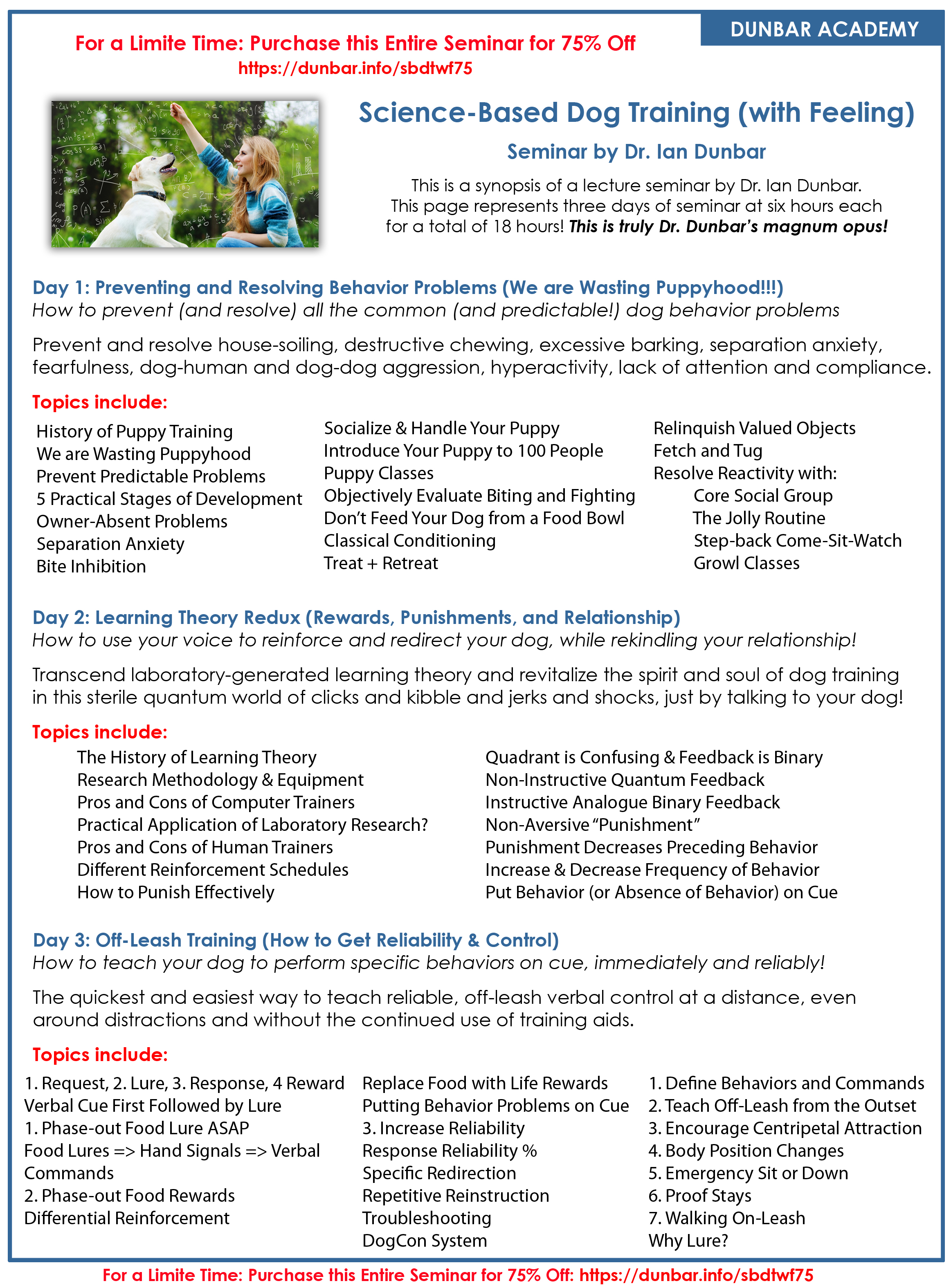Save 75%
Purchase Science-Based Dog Training (with Feeling) Today and save $150!
Dr. Ian Dunbar's Magnum Opus
The best dog trainers are guided by science, not limited by it.
This three-day seminar by world-renowned dog training expert Dr. Ian Dunbar is probably his most comprehensive and thorough set of lectures on the subject of dog training and behavior modification.
This seminar is the product of a lifetime of studying dogs. It brings together a wide variety of lessons learned from Dr. Dunbar's unparalleled experiences in the world of dog training, as a veterinarian, a scientific researcher, an animal behaviorist, a professional dog trainer and a young boy growing up on an English farm.
This seminar includes many principles and methods that have been scientifically proven in the research lab, and then adapted for the real-world environment and the many constraints that exist when a family of novices trains a pet dog in their home.
This online course has been approved for 18 Continue Education Credits by the CCPDT, IAABC & NADOI.
Dr. Ian Dunbar got his veterinary degree from the Royal Veterinary College of London and his PhD studying dog behavior and development at the University of California, Berkeley. In order to do so, he had to approach dogs scientifically, carefully analyzing cause and effect using objective quantification.
This approach give Dr. Dunbar the ability to reliably determine what works and what doesn't.
Too many dog trainers spend all of their time talking and theorizing without actually taking the time to test and measure whether their methods are actually effective. But dog training, like many things, can be easily measured and quantified and when you do that, you can quickly determine whether your methods work, how quickly they work, and how reliable the results are.
Dr. Dunbar has been applying a scientific approach to dog training for the past three decades and it is allowed him to develop methods that are incredibly effective, with the results to prove it.
By taking a scientific approach to dog training, Dr. Dunbar has been able to evaluate training methods in an objective way, to find what works best.
One of the key findings is that the most effective dog trainers make use of feeling, most often, but speaking to their dogs.
Science-based doesn't need to be sterile or robotic. You don't need to limit your interactions with your dog to clicks, treats, or monosyllabic, unemotional feedback. In fact, if you try to train a dog this way, you'll be dramatically handicapping yourself.
Dogs evolved to live with humans, and a big part of that is how they've learned to attend to our emotions. Dogs are very attuned to how we're feeling, and if you want to be the best dog trainer you can be, you have to be aware of that fact, and you have to use it.
The easiest, most effective way to take advantage of this is by talking to your dog, and not just limited to the cues and words you have taught your dog to understand. When you speak to your dog, they may not understand every word, but they can understand whether you are happy or upset and this is really valuable information for your dog.
Want to learn more?
Day 1 – We Continue to Waste Puppyhood
How to prevent the many behavior, training and temperament problems that are caused primarily in puppyhood yet are seldom manifested until adolescence and adulthood — housesoiling, destructive chewing, excessive barking, separation anxiety, fearfulness, dog-human and dog-dog aggression, hyperactivity, lack of attention and compliance.
Day 2 – Transcending Reinforcement Schedules, Going Way Beyond “Dominance" and Punishment and Rekindling the Relationship
How to use our voice to transcend laboratory-generated learning theory and revitalize the spirit and soul of dog training in this sterile quantum world of clicks and kibble and jerks and shocks.
Day 3 – Off-leash Verbal Control with Distance and Distractions; Phasing out Food Lures and Rewards and Naturally Motivating your Dog to Perform Quickly, Reliably and Willingly
The quickest and easiest way to teach reliable, off-leash verbal control at a distance, with distractions and without the continued use of training aids
